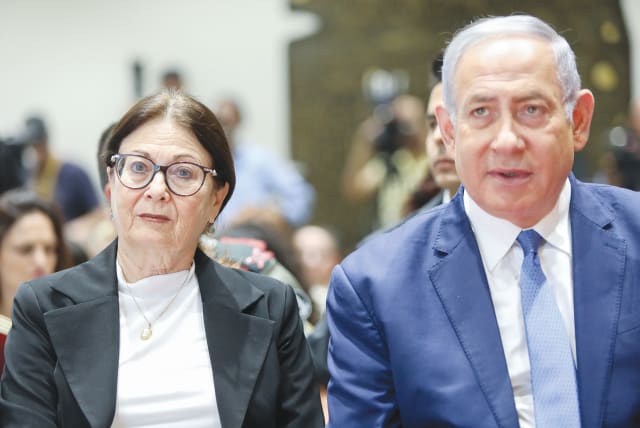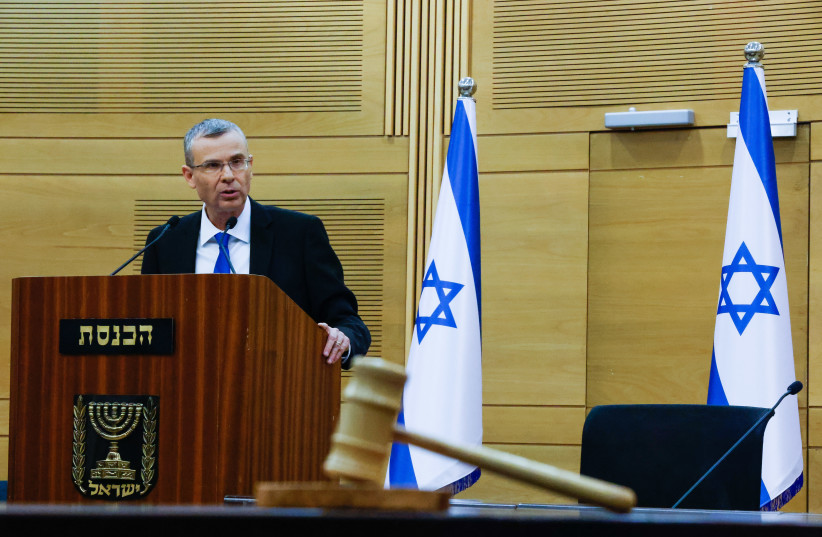Israel's justice minister, chief justice need to talk judicial reforms - opinion

If I could, I would ask Justice Minister Yariv Levin and Supreme Court President Esther Hayut to sit together in the same room and talk.
Since the formation of this government – actually, even before its formation – there has been a political storm about proposed changes to Israel’s judiciary. Large demonstrations have taken place. Articles screaming that the reforms represent a threat to Israeli democracy, as well as others suggesting that the country is doomed without them, have all appeared in the press.
Just weeks after the country completed its fifth contentious election cycle since 2019, when we finally appear to have a decisive outcome, the country seems to be coming apart at the seams. What can be done to restore the political civility that will afford our political leaders a “safe space” in which to carry out the legislative changes needed to improve the State of Israel?
If I could, I would ask Justice Minister Yariv Levin and Supreme Court President Esther Hayut to sit together in the same room and talk. Not necessarily so they could come to an agreement, but so they could have a proper dialogue, instead of just putting out competing press releases.
The goal would not be to cancel the proposed reforms, but to explain their necessity. Similarly, any talks should strengthen the Supreme Court and not harm it in any way. Constructive discourse is what is needed most right now in order to lower the flames and serve the Israeli people in a constructive manner.
A conversation on Israel's courts between Yariv Levin and Esther Hayut
IN MY view, the following conversation – which would take place in an ideal world – would benefit all Israelis, regardless of their political affiliations:
Levin: “I understood your speech, but I missed your reference to the more than 50% of the people who feel that the Supreme Court does not represent them”.
Hayut: “Who are these 50%?”
Levin: “These are the people of the ‘orange movement’ who feel that the court does not represent them. They were denied the right to demonstrate and the freedom of movement during the disengagement from Gaza.
“They are the ultra-Orthodox, for whom the High Court overruled the conscription law, even when they showed flexibility, they are the settlers in Judea and Samaria whom the High Court does not treat fairly.”
Hayut: “These are large populations, do you believe that our decisions, which were based on the letter of the law, were incorrect?”
Levin: “The feeling is that this adherence to the letter of the law is done one-sidedly. During COVID, for example, despite life-saving instructions, you allowed demonstrations in the name of freedom. Where was this freedom during the days of the struggle against the disengagement? The law has not changed, but your position has.
“The same goes for issues of land ownership in Judea & Samaria, and more. Don’t you understand, Madam, that the power of the court comes not only from its authority, but also from its credibility, which has been lost over the years?”
I HOPE that Hayut would then concede that the Supreme Court may indeed have made mistakes along the way, and as a consequence, that there may be a large percentage of the public who no longer believes in the Supreme Court. The following discourse would be forthcoming.
Levin: “Justice must be seen and not only practiced in order to generate trust, now is the time to act, to show the people that they are seen and heard, in order to restore the trust of the population as a whole.”
Hayut: “I am ready to accept that we were wrong, that we have lost the trust of nearly half of the public. But your plan is not necessarily a good fix, as it weakens the system too much.”
Levin: “We can talk now that we have come to the conclusion that the system needs to be reformed. Perhaps we can modify some sections of the reform in a way that will benefit Israeli society and promote the principle of separation of powers.”
“Sir, I would be happy to discuss the necessary changes in a civil manner. First, let’s agree to talk,” will come Hayut’s reply.
The writer is mayor of Efrat.
Jerusalem Post Store
`; document.getElementById("linkPremium").innerHTML = cont; var divWithLink = document.getElementById("premium-link"); if (divWithLink !== null && divWithLink !== 'undefined') { divWithLink.style.border = "solid 1px #cb0f3e"; divWithLink.style.textAlign = "center"; divWithLink.style.marginBottom = "15px"; divWithLink.style.marginTop = "15px"; divWithLink.style.width = "100%"; divWithLink.style.backgroundColor = "#122952"; divWithLink.style.color = "#ffffff"; divWithLink.style.lineHeight = "1.5"; } } (function (v, i) { });

